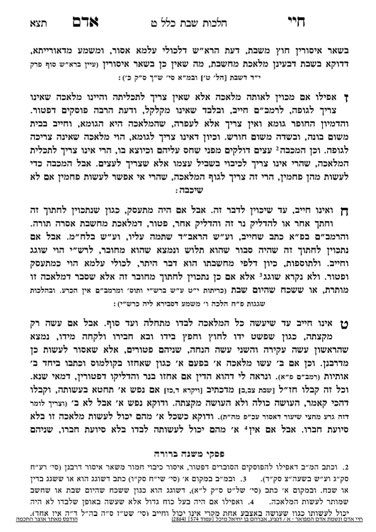We are continuing in siman 8, discussing the concept of misaseik. We left off discussing whether misaseik is assur on a Torah level or whether it is completely a din derabanan. This question is the subject of a long teshuva by Rav Akiva Eiger, based on a long Tosfos in Maseches Shabbos and Kerisos.
Rav Akiva Eiger concludes that there are two types of misaseik. One type of misaseik is where a person performed an action and was unaware of the implications of his action, such as where a person picks up an item attached to the ground, not realizing it was detached. One would be patur from a korban, based on the pasuk asher chatah bah, and it is considered a shogeig.
The second type of misaseik is where a person plans to perform melacha in a certain manner and ends up performing it differently, such as planning to cut one item and cutting a different one instead. This melacha is lacking in meleches machsheves, and therefore is not a melacha deoraysa. Although it may seem counterintuitive, we have learned that melacha deoraysa needs to be performed with intent (meleches machsheves), and we are missing that intent over here. (Although there is an opinion that this scenario is still considered meleches machsheves, the Chayei Adam follows the opinion of Tosfos that it is not considered meleches machsheves.)
The case we learned about a person carrying something unknowingly in their pocket is akin to the second type of misaseik. A case of knowingly carrying without realizing the eruv is down would be more akin to the first type of misaseik (although eruv anyways is derabanan). The practical difference between these two types of misaseik would be benefiting from maaseh Shabbos, in that if the misaseik is of the first type, the maaseh Shabbos would be assur on Shabbos itself, but if it is of the second type of misasek, it would be muttar.
However, the Nesivos Hamishpat disagrees. The Nesivos also wrote a sefer on hilchos Pesach, known as Mekor Chaim. There, he writes that misaseik is not an aveirah whatsoever, even when the aveirah in question is deoraysa. According to the Nesivos, there should be no issur on maaseh Shabbos, and one would be able to enjoy the outcome of the melacha performed through misaseik immediately.
However, the argument can be made that Chazal instituted an issur when misaseik is deoraysa as a knas (fine) to prevent people from performing a melacha b’meizid and claiming they were shogeig or misaseik. Thus, the knas which is primarily to avoid transgressing Shabbos will apply in any case that they need to protect a person from transgressing Shabbos b’meizid. Based on that argument, the Orchos Shabbos writes that the rules of maaseh Shabbos may apply to misaseik, even though it may not be an issur deoraysa.
It seems that practically, the knas of maaseh Shabbos (i.e., not benefitting from the item until after Shabbos) may apply to misaseik as well.
Summary
The knas of maaseh Shabbos may apply to all cases of misaseik; thus, one cannot benefit from the melecha performed as misaseik until after Shabbos.



